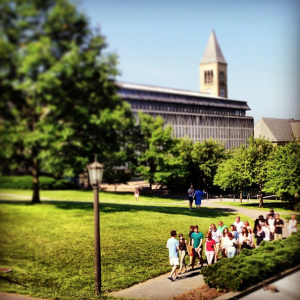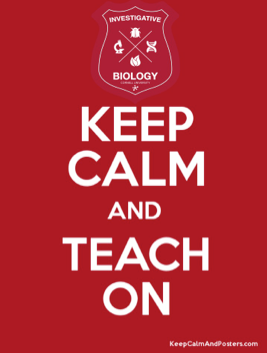 Have you ever watched the campus tour-guides walking backwards, telling cool stories about your university? If a tour group is too big, the people in the back lose interest quickly. Our graduate student lab instructors face a similar challenge: multiple student research groups design, set-up, and analyze different experiments in our teaching labs. It is easy to get too involved with assisting one group while accidentally ignoring others, who therefore do not receive similar guidance on their scientific journey.
Have you ever watched the campus tour-guides walking backwards, telling cool stories about your university? If a tour group is too big, the people in the back lose interest quickly. Our graduate student lab instructors face a similar challenge: multiple student research groups design, set-up, and analyze different experiments in our teaching labs. It is easy to get too involved with assisting one group while accidentally ignoring others, who therefore do not receive similar guidance on their scientific journey.
Lab instructors face this task because moving the course away from cookie cutter lab exercises and allowing students to conduct their own research has increased the number of potential questions that students may ask during a lab section. Inquiry-based learning techniques are designed to help students seek appropriate resolutions to problems that often do not have a correct answer. Therefore, we need the ability to guide students on their quest for knowledge without just simply handing the map over.
So as Director I found myself in need of a second teacher for each lab, one who could guide students on their scientific quest, who wouldn’t necessarily have all the answers, but knew enough to take on the role of tour-guide during a semester-long pilgrimage of Investigative Biology.
“A year and a half ago I found the 3-word answer to my quest: undergraduate teaching assistants.”
The Investigative Biology Labs had not had undergrad TAs before, so I needed to learn the ropes. Students can enroll in a course called “Undergraduate Teaching Experience”, and receive credit as well as a letter grade for their work. I select undergraduate TAs from a pool of students who completed the course during the previous semester, those who are enthusiastic about teaching and recommended by the graduate laboratory Instructors. They receive training and get assigned to two laboratory sections and assist the graduate student laboratory instructors with tasks ranging from lab set-up and demonstrations to office hours. They are a great source of wisdom for students, as they were in the same boat as them just a semester ago. When I discuss their teaching experience there is a reoccurring comment from the undergrad TAs:
“We are respected and looked upon as teachers in the classroom, despite that we may be younger than the students we teach. “
They feel energized by the fact that they can help fellow students and are viewed as the person with wisdom and authority in the classroom. Students often ask the undergraduate TAs questions that they may feel too intimidated to ask thegraduate lab instructor. They feel the “teacher’s high” (similar to a runner’s high, but uses up fewer sneakers), and as they often tell me: being on the other side helps them understand how faculty members think and what challenges educators face. This is a key concept in pedagogy, as good instructors try to think with the heads of their students, to be able to guide them better; to be able to design better exercises and ask better questions. For the undergrad TAs this teaching experience helps their learning process and their understanding of metacognition.
I am incredibly grateful to the handful of undergrad TAs who have been involved with this course so far. I wish we could provide opportunities to every student at Cornell University to experience the joy of teaching. One day these students may become professors and mentors, influencing the lives of future generations. We place emphasis on training our biology students to become good researchers, but teaching is equally important, and we cannot expose our students to pedagogy early enough. – Dr. Sarvary
